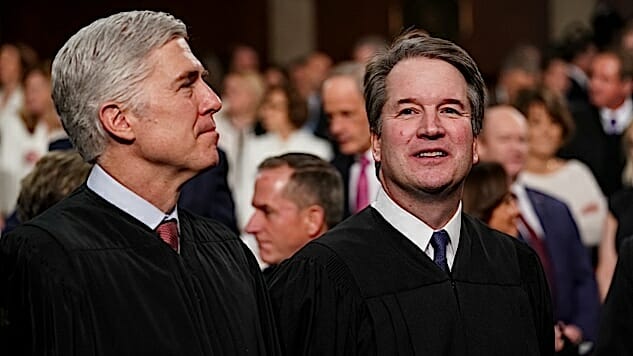Packing the Supreme Court Is No Longer Radical—It’s the Only Option
Photo courtesy of Getty
On Tuesday, the New York Times opinion section ran an editorial by Jamelle Bouie supporting the concept of packing the Supreme Court, which essentially means adding new seats in order to create a liberal majority. Currently, there are nine Supreme Court justices, and conservatives enjoy a 5-4 majority. Add four more seats, for instance, and make all four of the new justices progressive, and suddenly it’s an 8-5 edge for liberals. It’s also legal—as Bouie notes, the number of Supreme Court justices is up to Congress, and just because they haven’t expanded in 150 years doesn’t mean they couldn’t. FDR threatened to do exactly that when the conservative Court opposed his New Deal reforms, and it scared them enough to “change” their minds. It was called the “switch in time that saved nine,” because if they’d remained stubborn, they feared FDR and his Congress would have attempted to render the conservative majority irrelevant by packing the court with friendly justices. (As it happened, FDR’s bill stalled in the Senate.)
It’s a big move for the Times opinion page to run something like this. They’ll gladly run climate denial propaganda by Bret Stephens, along with endless centrist liberal takes, but something with a progressive bent like this is a relatively new look. While making his argument, Bouie runs down the greatest hits of the current Roberts Court:
We’re living through a version of this right now. Under Chief Justice John Roberts, the Court has denied Medicaid coverage to millions of poor people, neutered the Voting Rights Act, authorized new waves of voter suppression, unleashed the power of money for entrenched interests and would-be oligarchs, and opened the door to extreme partisan gerrymandering. And while this Court hasn’t brought the absurd Lochner-era doctrines that effectively made it impossible to legislate working conditions back from the dead, it has, in Justice Elena Kagan’s phrase, “weaponized” the First Amendment to strike down economic regulation and undermine organized labor.
Trump has nominated a relatively huge number of conservative federal judges in his short time in office, and most of them have been confirmed by the Senate. As Bouie points out, most of them are young-ish. So the problem actually goes deeper than the Supreme Court, but in terms of stopping a hypothetical future Democratic majority from governing, the highest court in the land poses the biggest threat. And judging by the record above, it’s a near-certainty that if Democrats manage to take both chambers of Congress and the presidency in 2020, the Supreme Court will continue to be a nakedly partisan body that tries to halt progressive governance in its tracks…by hook or by crook.
And it’s not like the GOP is fighting fair here, as the Merrick Garland process made explicit. One of the current justices, Neal Gorsuch, is illegitimate, and two of them (Clarence Thomas, Brett Kavanaugh) are likely guilty of sexual assault. So what’s the argument for playing by the polite rules of the game?
-

-

-

-

-

-

-

-

-

-

-

-

-

-

-

-

-

-

-

-

-

-

-

-

-

-

-

-

-

-

-

-

-

-

-

-

-

-

-

-








































